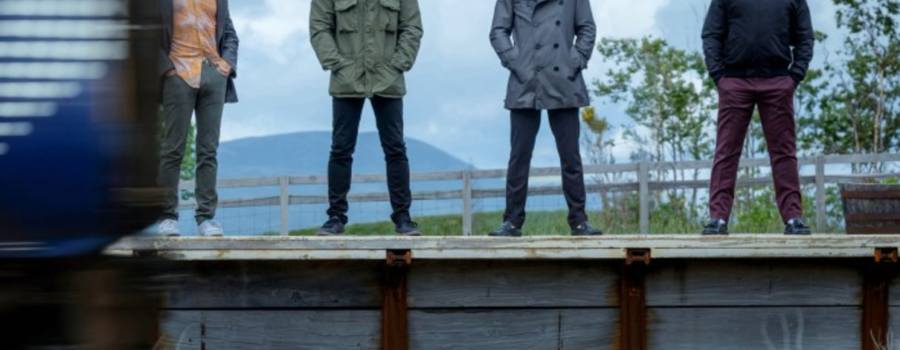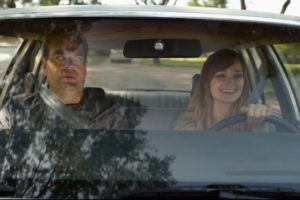
“T2 Trainspotting” U.K. Poster
[Featured on Awards Circuit] 2017 Berlin International Film Festival: Danny Boyle‘s original “Trainspotting” was a seminal masterpiece (and based on Irvine Welsh’s novel of the same name). Welsh’s novel is reminiscent of the “Angry Young Men” movement founded by British literary figures, playwrights and filmmakers. Referred to as “kitchen sink realism,” the movement morphed into exploring the issues of the lower class and their struggle with poverty, work and living conditions. It questioned the British status quo in the post-WWII era. Welsh’s novel was one of the modern British pieces of fiction that many characterize as part of the “New Angry Young Men” movement, taking the themes of its predecessor and representing the reflecting counter-culture of British youth in the 1990s. We see this realism and these themes explored directly in the first “Trainspotting,” expressed in an angry and immature way by the lovable hooligans of the film; immaturity was also an intentional characterization and form of delivery in both of these literary and cinematic movements. The novel’s sense of urgency in describing the diminishing lowerclass of the UK, particularly in Scotland, fit perfectly with Boyle’s directorial style, which is often characterized by a deliberately fast pace, quick takes and loud sound cues.
The drug-filled film became a worldwide pop culture phenomenon, launching the careers of Boyle, Ewan McGregor and Jonny Lee Miller, and introduced the world to this new style of filmmaking created by Boyle. Its soundtrack introduced British electronica to the world, and fueled and reflected simultaneously the “rave” movement of the 1990s.
“T2 Trainspotting” sees the whole crew, minus Tommy (Kevin McKidd), of course, who died in the first film, back together after a 20-year hiatus. Part of what took so long for this film to be made was a real-life ripple in Boyle and McGregor’s friendship, who had worked on every film together until 2000’s “The Beach,” when Boyle chose to cast Leonardo DiCaprio instead of McGregor. After not talking for nearly 15 years, their friendship was healed, much to the benefit of the medium of film. With no source material to adapt from, Boyle is not limited by Welsh’s work; he has more creative control with John Hodge’s (who also adapted the original screenplay) script as to which direction these characters went. The anticipation for this film has been building for years, as the original film was left open for a potential sequel, seeing Renton (McGregor) stealing money from his friends who consistently hold him back from being sober and taking off for a new life.
“Now I’ve justified this to myself in all sorts of ways. It wasn’t a big deal, just a minor betrayal. Or we’d outgrown each other, you know, that sort of thing. But let’s face it, I ripped them off – my so called mates. But Begbie, I couldn’t give a shit about him. And Sick Boy, well he’d done the same to me, if he’d only thought of it first. And Spud, well okay, I felt sorry for Spud – he never hurt anybody. So why did I do it? I could offer a million answers – all false. The truth is that I’m a bad person. But, that’s gonna change – I’m going to change. This is the last of that sort of thing. Now I’m cleaning up and I’m moving on, going straight and choosing life. I’m looking forward to it already. I’m gonna be just like you. The job, the family, the f—ing big television. The washing machine, the car, the compact disc and electric tin opener, good health, low cholesterol, dental insurance, mortgage, starter home, leisure wear, luggage, three-piece suite, DIY, game shows, junk food, children, walks in the park, nine-to-five, good at golf, washing the car, choice of sweaters, family Christmas, indexed pension, tax exemption, clearing gutters, getting by, looking ahead, the day you die.” Those were Renton’s final words of the film. For years, this powerful monologue has stuck with lovers of the original film.
So, what have Renton (McGregor), Spud (Ewen Bremner), Sick Boy (Miller), and Begbie (Robert Carlyle) been up to over the last 20 years? Did Renton follow through with his ambitious aspirations? The viewer finds out right away which characters progressed, which regressed and which remained the same. Renton has replaced his addiction to heroin with that of exercise. He is recently divorced, infertile and visiting Edinburgh from Amsterdam for the first time since his escape. A suicidal Spud has spent the last 20 years remaining a heroin junkie. It is important that Renton expresses to Spud in the film that they will always be addicts, it is just a matter of replacing that addiction with something else. Sick Boy, now preferring to be called by his birth name, Simon, runs a blackmail scheme out of a hotel. He, along with his self-proclaimed “girlfriend,” convince wealthy businessmen to pay to commit perverse acts, while Simon films it, confronts them and gets a healthy paycheck. His ultimate goal is to turn the old pub, which he now runs, into a brothel to compete with a local crime boss for the majority share of the prostitution market. He has replaced his heroin addiction with cocaine. Begbie, not surprisingly, has been in jail for the last 20 years. During a moment of classic “Begbie” rage, he escapes jail by asking one of his prison mates to stab him, thus sending him to the hospital and allowing him to escape after a forceful encounter with one of the nurses.
As Spud still represents the most “innocent” person in his past, he is the first person Renton visits. The timing is perfect, as Renton arrives at Spud’s flat to save him from killing himself from asphyxiation. He is met with hostility, and then a warm greeting, as Spud has been lost without him, not being able to stay clean for his wife, Gail (Shirley Henderson of the first film) and kid. Renton’s next move is to make amends with Simon. He also greets him with hostility, and then reveals his plans to make a brothel with Veronica, asking if he wants in. In reality, Simon is using Renton to ultimately exact revenge. After Begbie shows up at his pub, Simon informs him of Renton’s return, and the two of them form their own plan.
Right away, the immediacy and sense of conveyed anxiety of the first film has gone, and Boyle sets a new tone for this cinematic universe, one that is more soulful and heartfelt. Although Boyle’s signature quick takes, flashes and skewed camera angles are present in the film along with throwbacks to Lou Reed, Iggy Pop, and 1990s British electronica to the indelible soundtrack, he takes more time. The soundtrack also displays how the music and club scene has changed, as if pop culture has made the aging characters’ outsiders in their own society. Boyle lets the conversations and interactions linger, heightening the nostalgia for the viewer. The “Angry Young Men” movement has taken the back seat in this sequel. Its themes can still be seen through the lovable characters, surfacing occasionally, but, until the film’s climax, the feeling is relatively calm and, for the most part, feel-good. These characters have aged, but old habits die hard, and the sharp script by Hodge conveys this concept pitch-perfectly; time is all these characters have, and, fighting their wilder instincts, they are struggling not to make the same mistakes of the past.
The best monologue in the film, again, goes to Renton, during which he explains to Veronica that the “choose life” mantra he and his mates always used to repeat was just a slogan they picked up from an ’80s anti-drug commercial and expounded upon it to mock it, to mock life. He begins to channel the first film’s energy, transporting the audience through a time portal to 1996 for a brief but astoundingly eloquent moment. As Renton begins using examples of how his friends would apply the slogan to everyday life, he rapid-fires, pouring out his personal struggles and regrets over the past 20 years, while making sharp social commentary about how the world and society has changed. This sparks a brief love affair between the two. Now, consumed with technology and struggling with obesity, the world is not what it was. Somehow Leith, Edinburgh has avoided gentrification for the most part. In general Edinburgh is now more ethnically diverse, as people like Veronica immigrate to the UK and other democratic countries in search of opportunity, but Leith remains a predominantly lower class and unpopulated town in the film.
Veronica and Simon get caught up in the blackmail scheme, but, luckily, a friendly face from the past, Renton’s old lover, Diane (Kelly Macdonald of the first film), now a lawyer, covers for them. Renton’s encounter with Diane is brief but meaningful. There is no more love there, but a longing of the past that is mutually felt between the two. This yearning to hit the rewind button of life adds a bitter yet realistic edge to its tone. Eventually, Renton and Simon pitch a fake “building renovation” of the old pub to make it a historical landmark that provides opportunities to struggling youth, to which the city ironically approves, granting them $100,000. Veronica, eventually revealed as being a more layered character than the audience was initially led to believe, has a plan for herself, a plan that she has had since moving to Edinburgh. Viewers can expect a surprise ending.
The most satisfying new light added to this story is Spud’s blossoming. The theme of recovery in “T2 Trainspotting” goes far beyond addiction. These characters are trying to reconcile their troubled pasts. Refreshingly, Hodge and Boyle decide to delve deeper into these characters’ childhoods, accentuating their inseparable bond. Spud’s passion for writing is realized when Veronica compliments his stories and tells him to write them down. And they are good, even great and poignant. Spud’s newfound love of storytelling is his way out of heroin addiction, and it also serves as a clever meta narrative for how the rest of the film plays out. Spud decides to make his own ending. The film’s climax and resolution exudes almost every human emotion all at once; it is equal parts shocking, nostalgic, sad and euphoric. Viewers will have to wait until theaters to see how it unfolds, and if the childhood bond of these once great friends can resurface and amends can be made.
Do not miss this masterful sequel, which expands upon the universe and adds even more layers to the wonderful story, updating the social and political commentary to the current times. The film’s final shot in Renton’s room, with him dancing to that quintessential song from the original “Trainspotting,” that the audience eagerly awaited to hear throughout the film, intertwined with his memories. Renton’s past and present mannerism blend harmoniously, creating a transformative feeling that will leave viewers breathless. Within the context of the two films, it is the exclamation point that ties the stories together as one whole.
“T2 Trainspotting” is distributed by Sony Pictures Entertainment (SPE). The film had its Berlinale debut on Feb. 10 and hits theaters worldwide on Feb. 16. It debuts in the U.S. April 7.
GRADE: (★★★½)








Leave a Reply
Your email is safe with us.